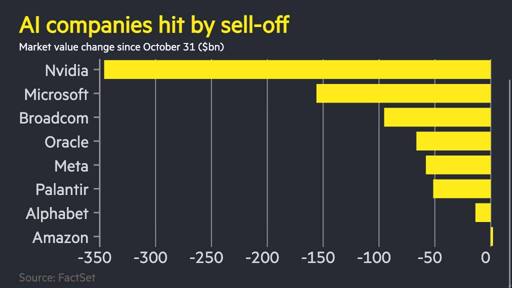- cross-posted to:
- usa@midwest.social
- usa@lemmy.ml
- cross-posted to:
- usa@midwest.social
- usa@lemmy.ml
$800bn? That’s more than the price of a house in Tamworth, NSW!

Tamworth
lol
call me when there’s something listed for 600 billy in Orange
For sale: a refurbished septic tank next to the train station, Bathurst, $950bn
For sale: a 2m² plot with a single person camping swag, Taree, $470bn
I am really curious if this is the start of the end of the AI boom. And I am curious if the end of AI boom will create a worse recession then 2008, because it seems to me like the only people directly affected will be techbro dickholes and a few billionaires who will hopefully do the same thing brokers did on Black Friday.
A lot of 401k havers will be impacted as well but so many people are so much worse off now than 2008 and have no retirements to lose that it will look different.
Every fund my retirement account website recommended had nvidia, apple and Microsoft in the top five holdings. I had to specifically know I didn’t want that and move the money out to get away from it… and the other funds are tied up in other stupid bullshit that seems like bubbles too. Imo Retirement accounts are a trap to make working class folks think like capitalists.
And with Nancy Pelosi retiring, you can’t even put your retirement fund in one of the ETFs that tracks her insider trading anymore

Well yeah
Considering the Burry Billion shorts I suspect this is the beginning of the bubble burst. Will there be a recession? Maybe, but considering that Trump refuses to release the latest economic data and was trying to manipulate it before that it’s likely we were already in a recession to begin with, this would just pull the mask off. The US probably can’t afford a recession, but the world can’t afford for things to continue like they are either.
Approximately one third of current US stock exchange value is caught up in AI companies, AI investments or AI value predictions. If that goes, especially when it goes quickly, a lot of money will disappear from many wallets.
And now to pull a page from the @sexywheat@hexbear.net playbook…
Since the article is paywalled and archive.ph isn’t working, I too will pull the article text from the source.
spoiler
TECH STOCKS SUFFER WORST WEEK SINCE APRIL AFTER $800BN AI SELL-OFF
US companies closely tied to the artificial intelligence boom have lost close to $1tn in market value since last Friday in the worst week for tech stocks since President Donald Trump’s “liberation day” tariffs in April.
The combined market value of eight of the most valuable AI-related stocks — including Nvidia, Meta, Palantir and Oracle — has fallen by about $800bn since the end of last week.
The declines left the tech-heavy Nasdaq Composite with a weekly loss of 3 per cent, its worst five-day run since the index fell 10 per cent after Trump launched his trade war with a blitz of tariff announcements in April.
“AI-related capital expenditures are substantial, increasingly debt-financed, and reminiscent of the 2000 tech bubble’s frenzy of questionable investments,” said Florian Ielpo, head of macro at Lombard Odier Investment Managers.
Four tech groups, Alphabet, Amazon, Meta and Google, last week reported a combined $112bn of capital expenditure in the third quarter. The sector is meanwhile borrowing hundreds of billions to fund its expansion in AI.
Amateur traders, who are notorious for buying most market dips, decided to stay on the sidelines this week, according to JPMorgan analysts.
Retail investors trimmed their positions in defence group Palantir following its earnings on Tuesday and took some profits on quantum computing stocks that have also surged this year, the bank said in a note to clients.
Concerns about sky-high valuations for Silicon Valley tech groups have collided this week with signs of weakness in the US labour market and waning consumer confidence in the world’s biggest economy.
The University of Michigan’s index of consumer sentiment fell to a three-year low in November.
The absence of key economic data caused by the longest-ever federal government shutdown, now stretching to 38 days, means investors are growing increasingly nervous that the labour market may have weakened substantially since late September.
“Perhaps the risk of a recession is creeping up under our noses,” said Mike Zigmont at Visdom Investment Group.
The Chicago Federal Reserve’s estimated hiring rate fell for the sixth consecutive month in October and investors have been spooked by a recent flurry of lay-offs announced by companies including Amazon, Paramount and Target.
“Hiring has been very weak. The [Federal Reserve] is behind the curve and needs to cut rates quicker,” said Stephen Yiu, chief investment officer of investment fund Blue Whale Growth, which has bet big on Nvidia.
“We don’t own the other members of the Magnificent Seven, I’m very concerned about them burning money to stay competitive,” he added.
Nvidia, the world’s most valuable company, has fallen the most in dollar terms over the week. Its market capitalisation declined by about $350bn, little more than a week since it became the first company ever to hit a $5tn valuation.
Microsoft, Oracle and Broadcom also lost ground during the week, although the market steadied at the end of trading on Friday.
Chief executive Jensen Huang told the Financial Times this week that he expected China was ultimately “going to win the AI race” against the US.
He subsequently tried to row back on the comments, saying that China was “nanoseconds behind America in AI”.
Huang on Friday signalled it was unlikely Nvidia would be able to sell a version of its latest Blackwell AI processors to Chinese customers. This would be a setback for the Silicon Valley chipmaker after hints from Trump in recent months that he might agree to such a plan.
This week’s debut of Beijing-based Moonshot AI’s Kimi K2 Thinking model, which reportedly cost less than $5mn to train, was hailed as the latest sign that Chinese competitors are narrowing the technical lead held by US developers.
The release of DeepSeek’s low-cost R1 model sparked a Wall Street panic in January that wiped $589bn from Nvidia’s market value in a single day.
“Is this another DeepSeek moment?” Thomas Wolf, co-founder of AI developer platform Hugging Face, said in a social media post about Kimi.
Comments this week by OpenAI’s finance chief Sarah Friar that the $500bn AI start-up might look to the US government to provide a funding “backstop” also triggered speculation about its finances.
The company has agreed $1.4tn in AI infrastructure commitments through an elaborate web of deals with chipmakers Nvidia, AMD and Broadcom, as well as cloud partnerships with Microsoft, Amazon and Google. These links mean that much of Big Tech’s expected growth in the coming years is now intertwined with OpenAI’s.
OpenAI’s chief executive Sam Altman sought to calm anxiety in a social media post on Thursday, saying the start-up does not want government guarantees, while predicting its revenue would “grow to hundreds of billion[s] by 2030”.
:erm-this-you:




imo it’s probably just a minor correction triggered by the recent wave of “bubble allegations”. investors and big tech firms still have money and are too deep in it to back down now. the bubble will probably burst when it turns out everyone overpromised and there is widespread fraud otherwise i don’t see the dumbshit investors losing confidence.
it’s also probably michael burry’s fault. he does something, day traders that only know him from big short YOLO all their portfolio with 20x leverage on short positions and puts, bot traders amplify the movement, shit goes down.

oh no that numby is so big!

Paywalled
Rugpulled
It’s starting
It’s afraid!















